Life on the tiny Scottish island down to its last five inhabitants hatching big plans to blaze trail for depopulated communities across the world
Ulva has no shops, no proper roads and the one tin can ferry stops running at 5pm – but hundreds have already applied to live on the majestic Inner Hebrides outpost
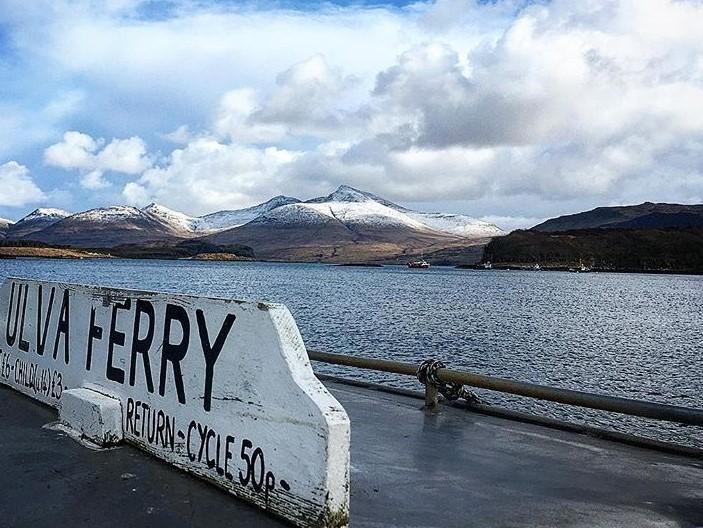
Your support helps us to tell the story
From reproductive rights to climate change to Big Tech, The Independent is on the ground when the story is developing. Whether it's investigating the financials of Elon Musk's pro-Trump PAC or producing our latest documentary, 'The A Word', which shines a light on the American women fighting for reproductive rights, we know how important it is to parse out the facts from the messaging.
At such a critical moment in US history, we need reporters on the ground. Your donation allows us to keep sending journalists to speak to both sides of the story.
The Independent is trusted by Americans across the entire political spectrum. And unlike many other quality news outlets, we choose not to lock Americans out of our reporting and analysis with paywalls. We believe quality journalism should be available to everyone, paid for by those who can afford it.
Your support makes all the difference.High on the hills of the tiny Scottish island of Ulva – population: five – John Addy stands, the sea below him, the hills rising steeply behind.
Down in the clear blue water, a long-deserted oyster farm can be seen. Straddling the rugged shore is a single row of ruined cottages once nicknamed Starvation Point and left empty since the 19th century. Up above, land previously grazed by Highland cattle is now brown and covered with bracken. Abandonment rules here.
“We’ve plenty of work to do,” says John, 67, all beard and boots. “But what a canvas to do it on. We’re offering people the chance to help rebuild paradise.”
Ulva – a rugged seven-by-three-mile crown a couple of minutes over the water from its bigger Inner Hebrides neighbour Mull – has, for two centuries, been an island in decline.
In 1851, it boasted a population of some 859 inhabitants: a thriving community of builders, farmers, merchants and tailors. Today, it has dwindled to a single family of four and their solitary neighbour. A listed church, Victorian reservoir and sprawling mansion complete with library and south-facing balcony have all been left derelict.
In a pattern repeated across dozens of Scotland’s 93 inhabited islands, waves of young people have ebbed away to the mainland as investment and jobs on these remote outposts became harder and harder to come by.
But here in Ulva, once a favoured holiday destination of both Beatrix Potter and William Wordsworth, there are plans afoot to reverse this particular tide of history.
A year ago, a local community company based in Mull bought the island from its aristocratic owner for £4.65m, most of which came from a grant supported by the Scottish government.
Now, they are hoping to create jobs here, build new affordable housing and tempt young Scots to make it their home.
In order to realise the dream they want to move in farmers to make the land profitable once more, open a campsite, hostel and mini-hotel to cater for curious tourists, and bring that oyster farm back into use. The target is to have at least 30 people living here within a decade, and 50 by 2040. That derelict church – a secluded white-walled Thomas Telford design – has already been earmarked as a possible part-time music venue.
“Imagine seeing a show there,” enthuses John, a director with the North West Mull Community Woodland Company (NWMCWC), which bought the land. “Walking home afterwards, by the sea and the stars – magical.”
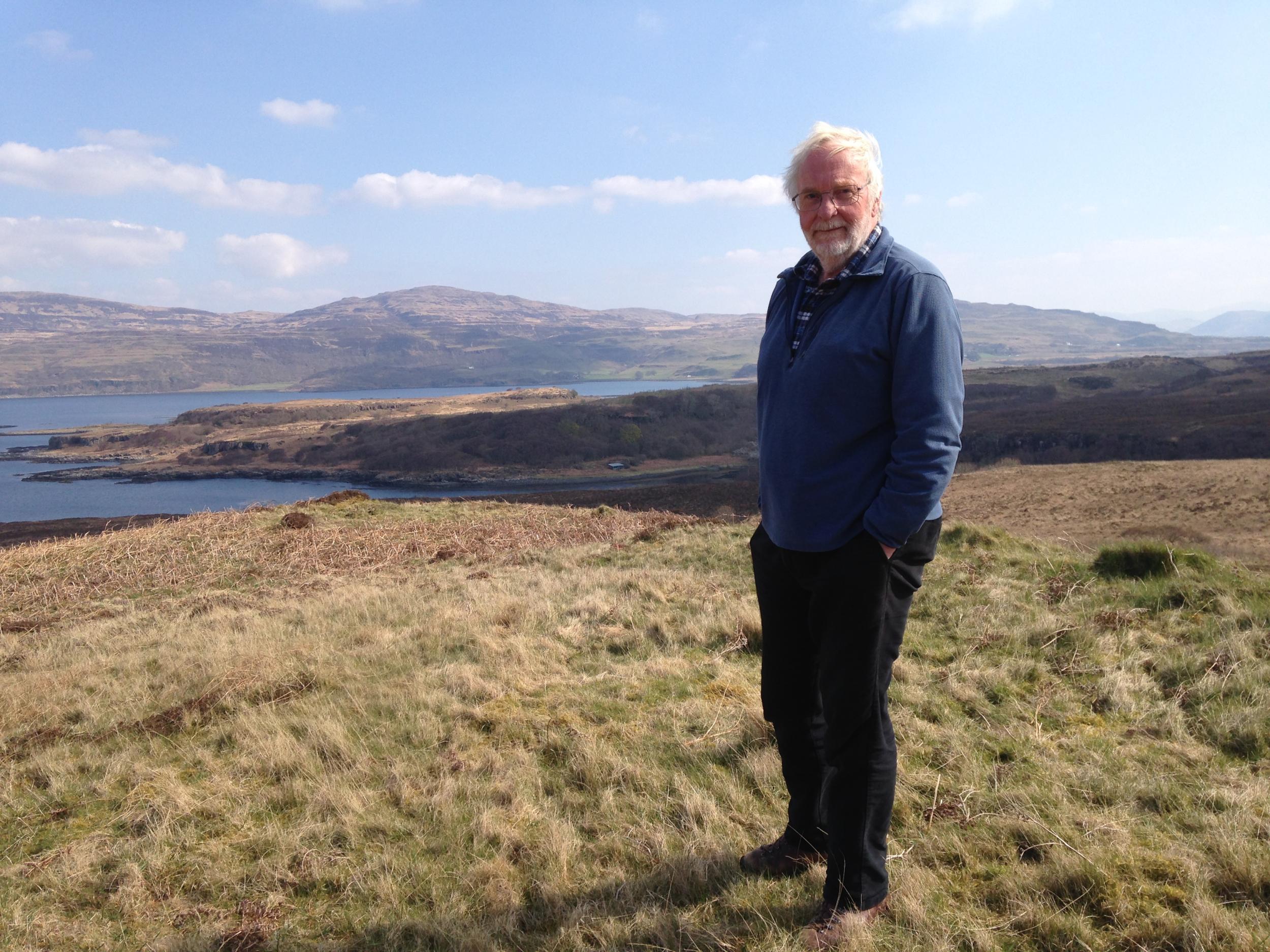
Crucially, these plans have significance far beyond this slug of rock alone. If the transformation is successful, it is hoped it could become a template for other Scottish islands facing similar decline, and an inspiration to communities across the planet struggling with depopulation.
The good news, then, is the signs, so far, are positive. A survey conducted by the Highlands Small Communities Housing Trust in January saw almost 500 people register official interest in becoming residents of Ulva. Many of them had exactly the skills needed to rebuild a community from scratch: forestry experts, land labourers, one woman who proposed opening a pony-trekking business for visitors.
“For pretty much all recorded time – and before that too – there has been a vibrant, close-knit community here,” says John, a retired marine biologist originally from Yorkshire but now living on Mull. “And people still want to live here. If we can offer sustainable economic opportunities, we have no doubt they’ll come.”
Sitting outside the glorious Boathouse restaurant on the island’s eastern shore later, it is easy to understand his confidence.
Some 5,000 daytrippers come here every summer from as far and wide as Australia and Canada (where many Ulvians moved in the mid-1800s when much of the land was forcibly cleared for agricultural use). They are drawn by the ruins, pristine sea views and abundant wildlife: deer, seals, hen harriers and more than 500 types of plant are native to the islet.
At the next table along at the restaurant today are a family of English visitors. “It’s basically an idyll, isn’t it?” says Dad, tucking into the fish of the day. Would he move here, I ask? He pauses, possibly considering the fact there are no shops, no real roads and only one tin-can ferry that stops running at 5pm. “You’d need to be pretty self-sufficient,” he concedes. “I might be a bit soft.”
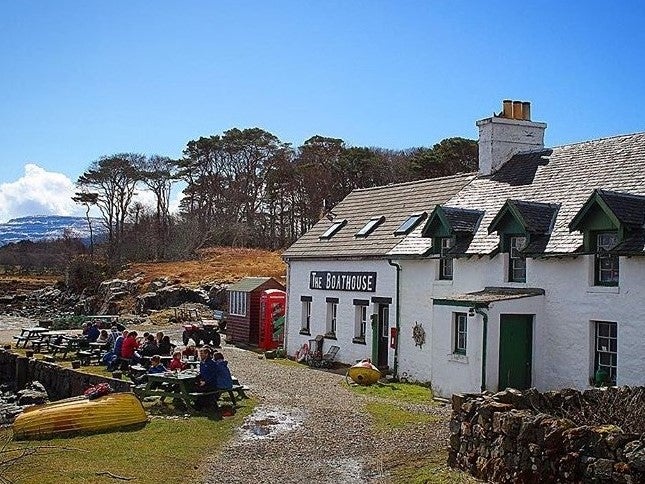
Such concerns did not, apparently, put off the Russian oligarchs and Middle East sheikhs who originally expressed interest when the island’s laird Jamie Howard – whose family had owned the place since the Fifties – first put it up for sale in 2017.
Indeed, it was the thought of such buyers that sparked the initial proposals for a community purchase.
The island’s five residents and many in Mull were horrified by the thought that Ulva could be turned into the private playground of an overseas landlord. So, after a local referendum showed support, the NWMCWC – which was originally set up in 2006 to run a local woodland – moved to buy the land.
With a £4.4m grant from the Scottish Land Fund and the political support of the SNP government, which has long said it prioritises preserving the country’s islands, the not-for-profit group took ownership on midsummer’s day 2018.
It became the third Scottish island to be bought by the community following Eigg in 1997 and Gigha in 2001. Hearteningly, perhaps, both those have since reversed population decline, albeit from far bigger bases than Ulva’s five people (Eigg had 60 living there, Gigha 98).
“I’m pretty old-fashioned and not one for crying,” says Rhuri Munro, owner of The Boathouse and board member of the NWMCWC. “But I was close that day we took over.”
He had more reason than most to be emotional: Rhuri is a member of the one solitary family who remain residents on Ulva.
The 36-year-old first moved here with his own parents when he was eight and the island’s population still stood at about 30. Dad Donald came to run the ferry, a job he still does, although he himself now lives on Mull.
Rhuri left at 18 but returned with wife-to-be Rebecca – originally from Dumfries – in 2006. They took over the then vacant Boathouse; expanded it to accommodate more of those visitors; and took the decision to raise their children, Matilda, eight, and Ross, five, on the island.
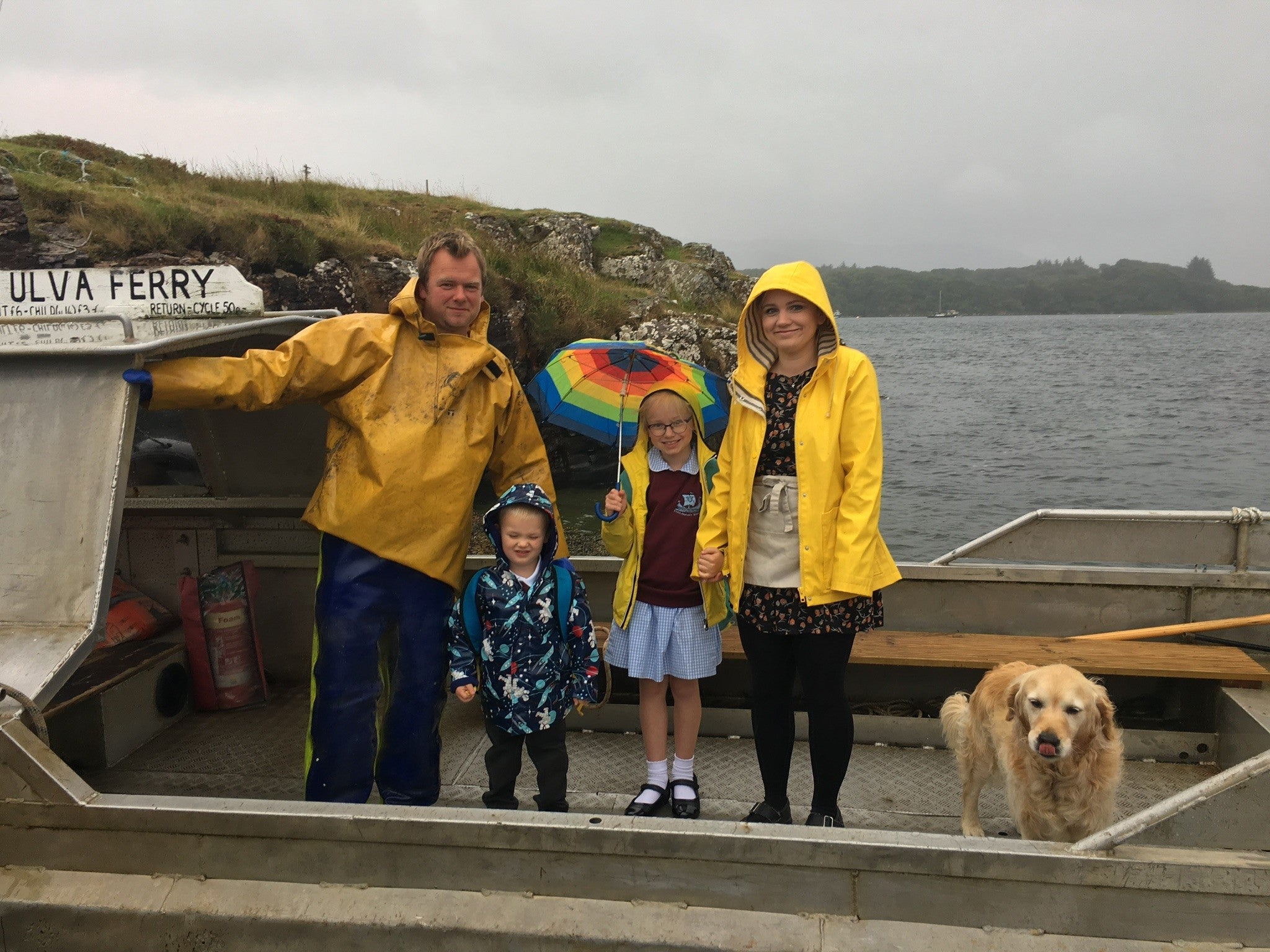
“It’s not an easy place to live,” he says just before he heads off fishing. “We have broadband and everything but, ultimately, it is an island and it comes with all the logistical issues you’d expect. You can’t get to a shop after 5pm. But I think back to my own childhood and I remember swimming, boating, playing in woods. Being safe. That’s what we want for our two.”
Every day, he explains, Donald ferries Matilda and Ross across the water to school.
“You can’t get a better commute than that,” 31-year-old Rebecca chips in. “But what we want now is to see that boat full of kids again. Full of friends.”
Some progress has already been made.
The NWMCWC – a company that comprises eight volunteer directors and four staff – has funded the restructuring of the island’s decaying slipway and signed off plans to renovate six derelict cottages for six new families. If funding grants come in, it says, it could all be done within 18 months. Then, it would look to facilitate the building of six brand new homes, probably with a social housing company.
Simultaneously, proposals are being worked up to divide the land into farmable plots and transform the mansion house, possibly into a mini-hotel. Companies are being sought to run wildlife tours, mountain bike trails or sea sports. A record producer in the US has got in touch suggesting he could run artistic retreats there. A full-time Ulva development officer is to be appointed this summer to oversee it all.
Rhuri and Rebecca themselves, meanwhile, have carved new signs for the island’s pathways pointing walkers towards the best ruins, wildlife sites and the island’s Neolithic stones. He has been levelling off some of the tracks, while she has dealt with much of the admin that comes with suddenly part-owning an island.
“I knew trying to rebuild a community would mean hard labour,” says Rhuri, a little ruefully. “I just didn’t realise how many emails it would mean dealing with.”
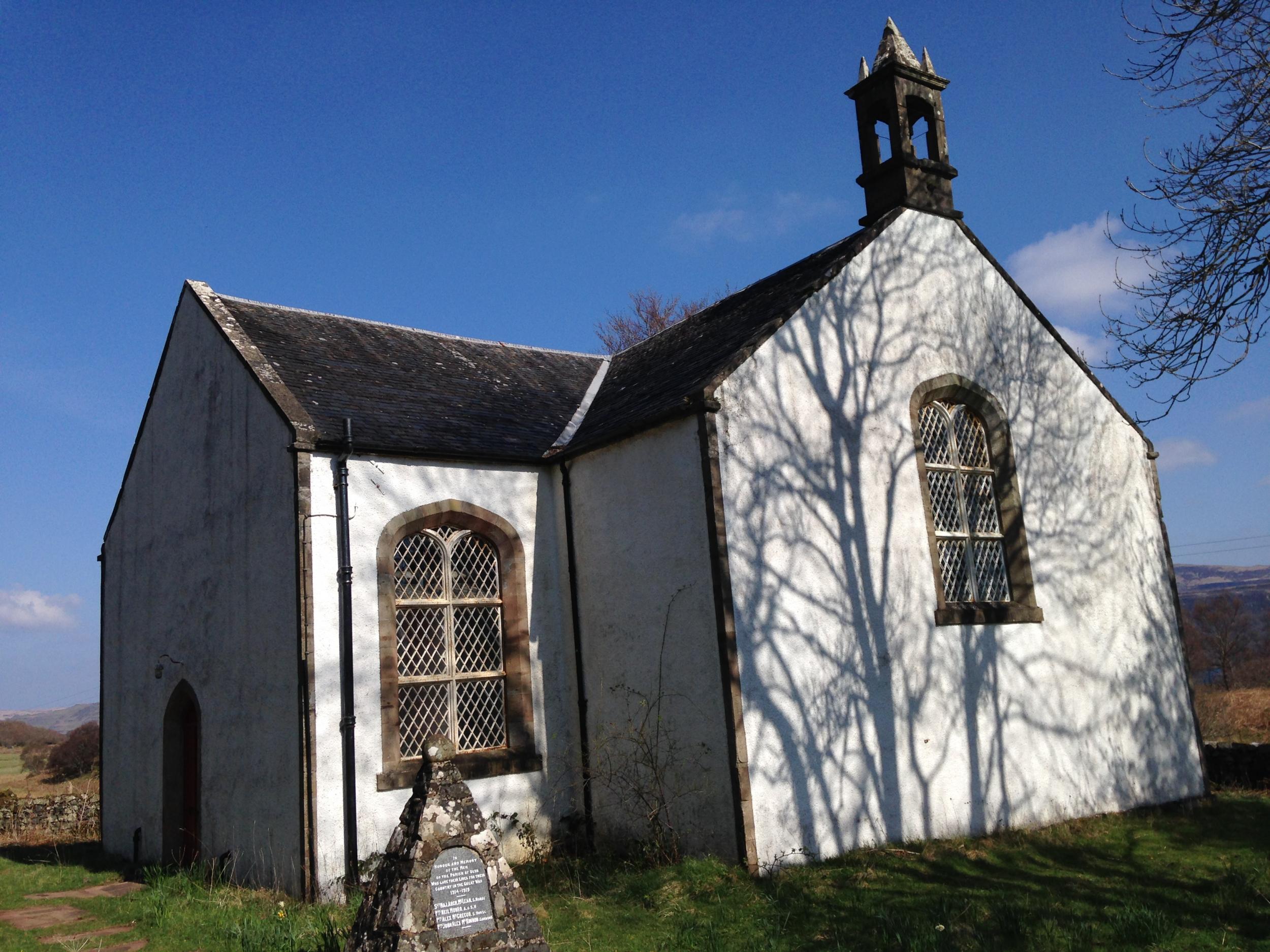
Much of that admin has to do with money. Regeneration doesn’t come cheap, especially on a land out in the sea. Renovating those first six houses alone could cost £1m.
But there is a quiet confidence of getting the grants needed: given that £4.4m of taxpayers’ money has already been sunk into buying the island, there is much political will in Edinburgh to see Ulva become a sustainable success.
Nonetheless, that outlay has also caused some to have their doubts about the whole project.
Over on Mull later, I visit the island’s biggest town, Tobermory – a comparative metropolis of 2,000 people that Rhuri calls “the big smoke”.
There I speak to Andrena Duffin, secretary of the Mull Community Council, in her garden overlooking the sea. “I wish the project every success and, as a council, we will offer all the support we can,” she says. “It is important – to Scotland as a whole, actually – these communities prosper.”
But?
The 76-year-old, who spent her own childhood summers on Ulva, is hesitant to criticise and chooses her words carefully. “There are some people who feel that kind of money could have been spent on infrastructure that would have benefited more people,” she says, mentioning Mull’s narrow roads, its crumbling main ferry pier and the island’s poor broadband as all in undisputed need of significant investment.
“But, in any case, now this is happening, as a community, I think we will pull together and make it work,” she says.
Back on Ulva itself, there are plans to celebrate the first year anniversary of the buyout with a music festival in the mansion house gardens – which volunteers have spent the last 12 months weeding out and sprucing up.
I meet the island’s only other resident, Barry George, a labourer from Newcastle who moved here 30 years ago to work on a fish farm and was so enamoured he decided to stay even when the work dried up and other islanders left. When I ask the appeal, he looks at me perplexed for a moment.
“Look around,” he says after a second. “I never saw a more beautiful place.”
Today, he does odd jobs, studies for an Open University degree and opens his little cottage up as an occasional B&B for those wanting to stay the night on the island.
He lives five minutes from the Munros and the Boathouse but has not got too heavily involved with the buyout. Nonetheless, he too says he dreams of seeing the island become prosperous once more.
“I love the tranquillity here,” he says, indicating the sea below, the hills above. “But we do need more people. We need life back again.”
Join our commenting forum
Join thought-provoking conversations, follow other Independent readers and see their replies
Comments